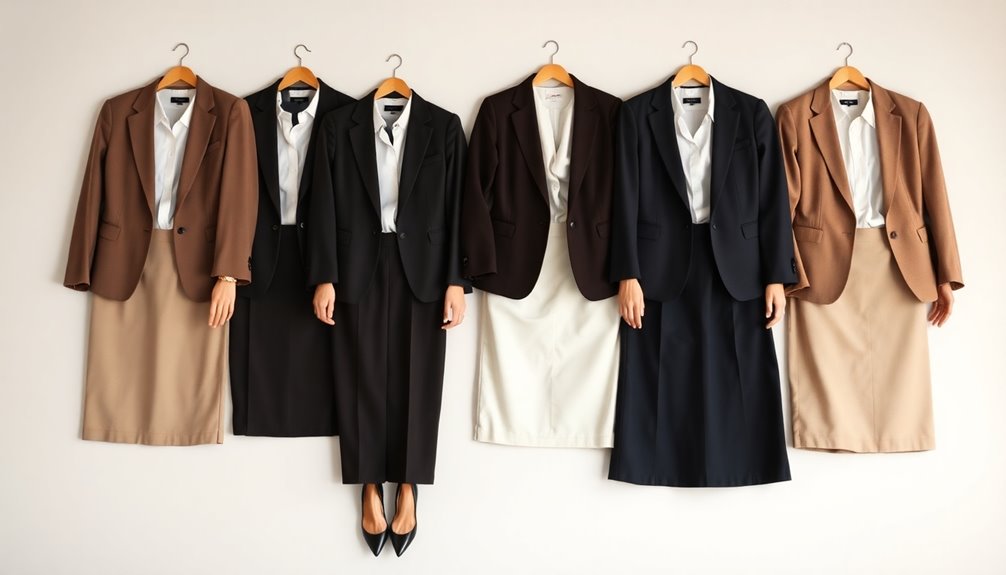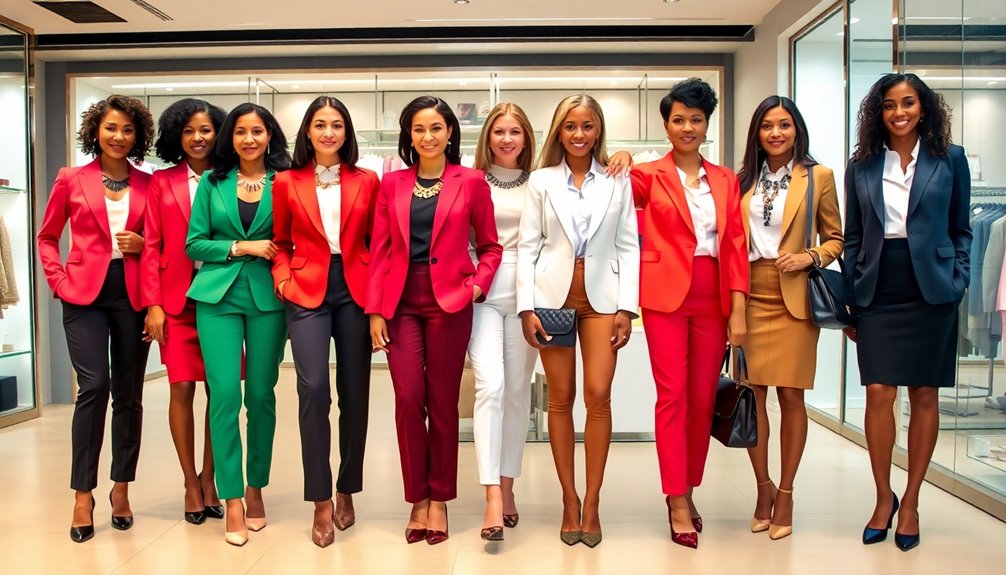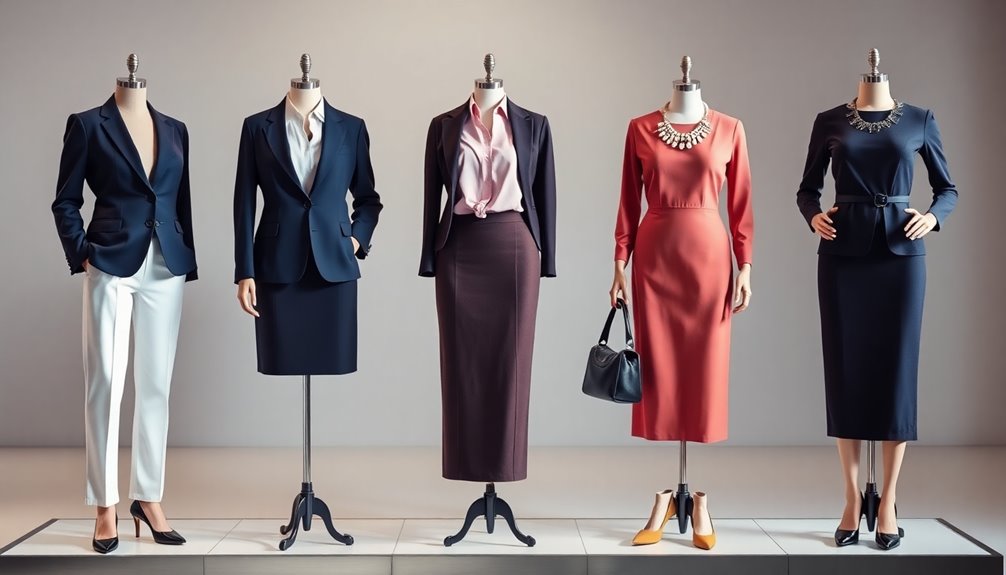When preparing for a job interview, your outfit choices are key to making a great impression. Consider conservative attire like tailored suits in dark colors for formal settings. If you're interviewing in creative fields, opt for smart casual looks with fitted pants or dark jeans paired with blouses and blazers. For teaching roles, soft colors and knee-length skirts work well. Always prioritize comfort with closed-toe shoes. Remember, your outfit should reflect your professionalism while being appropriate for the company's culture. To explore more styles that captivate employers, you'll find plenty of options ahead.
Key Takeaways
- Tailored suits in dark colors convey professionalism for conservative company interviews; opt for knee-length skirts or dresses for a polished look.
- Smart casual outfits, like tailored pants with blouses, are ideal for creative fields; layer with blazers to enhance professionalism.
- Incorporate soft pastel colors or subtle patterns to showcase individuality while maintaining a welcoming and polished appearance.
- Minimal accessories, such as small earrings or classic watches, maintain a professional look without distraction during interviews.
- Choose closed-toe flats or low-heeled shoes for comfort and support, ensuring a refined appearance throughout long interview durations.
Conservative Company Attire

When you're preparing for an interview at a conservative company, your outfit choice plays an important role in making a strong first impression. Opt for business formal attire that signals professionalism and authority. Tailored suits, whether pantsuits or skirt suits, in dark, muted colors like navy, gray, or black are your best bet. Pair your suit with an elegant coat or blazer and a simple blouse to maintain a polished appearance.
If you choose a knee-length skirt or dress, make sure it's not too tight or flashy. This helps uphold a professional and respectful image, essential for conservative environments. Remember, well-fitted clothing is critical; ill-fitting attire can detract from the polished impression you want to convey.
Keep your accessories minimal and understated. Small earrings or a classic watch will complement your look without distracting from your overall presentation. By focusing on these elements, you'll guarantee that your outfit not only meets the conservative dress code but also highlights your professionalism and confidence during your interview. Dress appropriately, and you'll leave a lasting impression on your potential employer.
Casual Interview Looks

When you're heading to a casual interview, smart casual combinations can really set the right tone. Pair tailored pants or dark jeans with a blouse, and don't forget to choose stylish yet comfortable footwear like ballet flats or loafers. A tailored blazer can add that professional touch, helping you strike the perfect balance between relaxed and polished.
Smart Casual Combinations
Crafting the perfect smart casual outfit for an interview means striking a balance between professionalism and comfort. When putting together your smart casual outfits, consider starting with tailored pants or dark jeans, both of which can offer a polished yet relaxed appearance. Pair these bottoms with a well-fitted blouse or tailored shirt to enhance your structured look.
Opt for neutral colors like black, navy, or beige to keep your outfit professional. Subtle patterns can inject a touch of personality without overwhelming the overall aesthetic. Layering with a tailored blazer or cardigan can elevate your look further, making it suitable for various workplace environments.
Don't forget about your choice in professional shoes. Comfortable options like loafers or stylish flats are essential, helping you maintain that polished appearance while ensuring you feel at ease throughout the interview. Accessories should remain minimal; a simple watch or understated jewelry works best to keep the focus on your outfit. By combining these elements, you'll create a smart casual ensemble that impresses employers and reflects your professional demeanor.
Footwear and Accessories Tips
Nailing the right footwear and accessories for a casual interview look can make a significant difference in how you present yourself. Choose comfortable professional shoes like ballet flats, loafers, or low-heeled shoes to guarantee ease of movement throughout the day. Your footwear should always be clean and polished, as well-maintained shoes contribute to a polished appearance, reinforcing your professionalism even in casual settings.
When it comes to accessories, keep it minimal and thoughtfully chosen. Simple stud earrings or a classic watch enhance your overall appearance without overwhelming it. This approach helps maintain a professional aesthetic while still allowing your personality to shine through. If you're in a creative field, consider incorporating subtle colors or patterns in your accessories for a touch of flair.
Additionally, don't underestimate the power of a tailored blazer over a smart top. This combination elevates your casual outfit, striking the perfect balance between polished and relaxed. By focusing on these footwear and accessories tips, you'll present yourself confidently and make a lasting impression in your casual interview.
Video Interview Essentials

As you prepare for a video interview, remember that your outfit can make a significant impact on how you're perceived. Choosing the right video interview essentials is essential for leaving a lasting impression. Opt for solid colors, as they provide clarity on camera and help you avoid distractions from busy patterns. Soft shades like blue, green, gray, and red are particularly recommended, as they create a flattering appearance under various lighting conditions.
A well-tailored blazer can elevate your look dramatically, giving you a polished and professional edge. Even though your lower half might not be visible, wearing appropriate pants or skirts is a smart move, especially in case you need to stand up unexpectedly. Since comfort is also key, select comfortable footwear like loafers or ballet flats to keep you at ease during longer interview sessions. Additionally, consider the impact of data-driven decisions on your overall presentation strategy, as they can inform your outfit choices and boost your confidence.
Teacher Interview Outfit

When preparing for a teacher interview, you want to strike the right balance between professionalism and approachability. Opt for knee-length skirts or tailored pants with soft pastel colors and subtle patterns to showcase your personality while still looking polished. Don't forget to choose comfortable closed-toe shoes, as you'll want to make a great impression without sacrificing your comfort during the interview.
Professional Yet Approachable Attire
A well-chosen outfit can set the tone for a successful teacher interview. Aim for professional yet approachable attire that makes a positive impression. Consider wearing knee-length skirts or tailored pants paired with stylish blazers in soft pastel colors. This combination strikes a balance between professionalism and warmth.
Opt for fitted blouses or smart tops to add a polished touch. Avoid overly casual items like jeans or t-shirts, as they can detract from your credibility. Closed-toe shoes, such as flats or low-heeled options, not only convey a refined appearance but also guarantee comfort throughout the day.
While you want to showcase your personality, incorporating subtle patterns or colors can keep the focus on you. It's best to keep accessories minimal, allowing your outfit to speak for itself. Dressing slightly more formally than typical classroom attire shows respect for the interview process and conveys your seriousness about the role. Additionally, ensuring that your outfit is energy-efficient technology can reflect your values and commitment to sustainability in the educational environment.
Color Choices and Patterns
Choosing the right colors and patterns for your teacher interview outfit can greatly influence the impression you make. Opting for soft pastel colors like light blue, pink, or lavender can create a welcoming and approachable appearance, which aligns perfectly with the nurturing nature of the teaching profession. To maintain a professional yet friendly look, consider these key elements:
- Tailored Pants or Knee-Length Skirts: Choose neutral shades such as beige or navy to keep your outfit polished.
- Subtle Patterns: Incorporate stripes or small floral designs to add personality while ensuring you remain within the bounds of professionalism.
- Stylish Blazer: A blazer in a complementary color can elevate a simple blouse and skirt combination, giving you a polished and authoritative presence.
Remember to avoid overly bright or distracting patterns, as they may divert attention from your qualifications and teaching philosophy during the interview. By carefully selecting your color choices and patterns, you can present yourself as both professional and approachable, making a lasting impression on your potential employer.
Footwear for Comfort and Style
Selecting the right footwear for your teacher interview plays a significant role in balancing comfort and style. You'll want to choose shoes that not only look professional but also provide the support needed for long hours of standing or walking. Closed-toe flats or low-heeled shoes are ideal options that meet these criteria.
Here's a quick comparison to help you decide:
| Footwear Type | Comfort Level | Professional Appearance |
|---|---|---|
| Ballet Flats | Comfortable | Polished |
| Loafers | Comfortable | Polished |
| Low-Heeled Shoes | Comfortable | Professional |
| Sandals/Sneakers | Low | Casual |
Opt for neutral colors that seamlessly complement your outfit while maintaining a polished look. Prioritize footwear with good arch support, especially if your interview includes a school tour. Avoid overly casual options like sandals or sneakers, as these may undermine the professional tone you want to convey. A well-chosen pair of shoes enhances your confidence and leaves a positive impression on potential employers. Remember, the right footwear can make all the difference in how you present yourself!
Tech Industry Attire

When preparing for a job interview in the tech industry, it is vital to strike the right balance between professionalism and comfort. You'll want to showcase your personality while adhering to the company culture. Smart casual attire is widely accepted, making it easier for you to feel confident.
Here are three essential outfit choices to take into account:
- Tailored Trousers and Fitted Blouse: Opt for tailored trousers in neutral colors like gray or black, paired with a fitted blouse or smart top. This combination exudes professionalism while allowing for comfort.
- Knee-length Skirt: A knee-length skirt can be an excellent choice, especially when paired with a chic top. This look is polished yet approachable, perfect for tech environments.
- Layering Options: Incorporate a blazer or cardigan to elevate your outfit. Not only do these pieces add sophistication, but they also provide flexibility for varying office temperatures.
Remember to research the specific company culture; some may embrace a more laid-back style, while others expect a sharper look. By choosing appropriate interview outfits, you'll make a lasting impression.
Creative Field Styles

In creative fields, your outfit can be a canvas for self-expression, so don't shy away from bold colors and unique patterns. Choosing eye-catching textures can set you apart while still keeping a professional edge. Remember, it's all about balancing your personal style with the expectations of the industry, so research the company culture to find that sweet spot. Additionally, embracing innovation and originality in your outfit choices can reflect your creative spirit and align with industry values.
Bold Color Choices
Embracing bold color choices can greatly enhance your appearance in a job interview, especially within creative fields. Wearing vibrant colors like deep blues, rich greens, or vibrant reds can convey your confidence and creativity, traits highly valued in these industries. To guarantee you maintain a professional style while showcasing your personal style, consider the following tips:
- Balance with Neutrals: Pair your bold colors with neutral pieces like black trousers or a tailored blazer. This balance keeps your look polished and sophisticated.
- Know the Company Culture: Research the company's culture before choosing your outfit. Creative environments often welcome brighter shades, while more conservative workplaces might prefer subtler tones.
- Make an Impression: Bold colors can help you stand out and appear more approachable and dynamic in your interview, making it easier to connect with your potential employer. Additionally, focusing on your mindset to attract abundance can further enhance your confidence during the interview process.
Unique Patterns and Textures
Showcasing unique patterns and textures in your job interview outfit can set you apart in the creative field. Incorporating elements like stripes or subtle geometric designs allows you to display your creativity while maintaining professionalism. Textures such as lace, chiffon, or tailored wool can add depth without compromising formality.
When selecting outfits, balance patterned pieces with solid colors to avoid overwhelming your look. This guarantees a polished appearance that impresses employers. Bold prints can work well, but make sure they align with the company culture to avoid looking overly casual.
Here's a quick guide to help you choose the right patterns and textures:
| Patterns | Textures |
|---|---|
| Stripes | Lace |
| Geometric Designs | Chiffon |
| Floral Prints | Tailored Wool |
Accessorizing is essential. Minimalistic jewelry or textured fabrics can enhance your outfit featuring patterns, creating a cohesive and sophisticated look. Remember, it's all about balancing creativity with professionalism to make a lasting impression during your interview.
Personal Style Expression
While expressing your personal style in a job interview, especially in creative fields, it's crucial to find a balance between individuality and professionalism. You want to showcase your creativity while still appearing polished and respectful of the company's culture. Here are three effective ways to achieve that:
- Opt for tailored dresses or stylish pants: Pair them with eye-catching blouses to create a memorable first impression. This combination reflects both your passion and creativity, presenting you as a serious candidate.
- Incorporate fashion-forward accessories: Use statement jewelry or trendy bags to enhance your overall look. Accessories can add flair without overwhelming your professional appearance, allowing your personal style to shine through.
- Align your outfit with the company culture: For example, wearing a fashionable blazer over a graphic tee for a startup can demonstrate both your understanding of the industry and your creativity.
Non-Profit Interview Options

When preparing for a non-profit interview, opting for business casual attire can set the right tone. A knee-length dress or skirt paired with a blouse strikes the perfect balance between polished and approachable. Neutral colors are your best bet; they convey professionalism and respect for the organization's mission. You can add subtle patterns or accessories to showcase your personal style without overwhelming your look.
Closed-toe shoes, like professional flats or low-heeled options, maintain a refined appearance while ensuring comfort during the interview. Comfort is key since you'll want to focus on engaging with your interviewers, not fidgeting with your outfit.
It's also essential to demonstrate your understanding of the non-profit's culture. Research their values and tailor your outfit accordingly to align with their mission and audience. This thoughtful approach shows respect for the organization and enhances your overall presentation. Remember, less is often more—incorporating minimal accessories can elevate your professional image without distracting from the conversation. With these guidelines in mind, you'll feel confident and ready to impress during your non-profit interviews. Additionally, showcasing your strong communication skills during the interview can further enhance your chances of making a positive impression.
Startup Interview Outfits

Maneuvering the startup interview scene calls for an outfit that balances casual comfort with polished professionalism. In these creative environments, you want to dress professionally while still fitting into the company's culture. A great first impression is key, so choose your attire wisely.
Here are three ideal startup interview outfits:
- Dark Jeans with a Smart Top: Opt for tailored dark jeans paired with a chic blouse or a smart top. This combination strikes the perfect balance between business casual and comfort.
- Tailored Blazer: Layer a fitted blazer over your top. It adds a polished touch and elevates your casual look, showing you mean business.
- Chic Flats: Footwear matters, too! Choose stylish flats that are comfortable yet professional. They'll keep you looking sharp without sacrificing comfort.
Stick to neutral colors or soft shades, allowing a hint of personal flair without being too overwhelming. Minimal accessories can enhance your outfit, but don't let them distract from your overall professional appearance. Research the startup's culture ahead of time to ascertain your outfit aligns with their vibe. Additionally, embracing an iterative process in your outfit selection can help you refine your style for future interviews.
Retail Management Attire

Dressing for a retail management interview requires a thoughtful approach to balance professionalism with approachability. You'll want to choose fitted pants or dark jeans paired with blouses in neutral colors or soft shades. This combination conveys professionalism while maintaining a polished, friendly appearance.
Adding a tailored blazer can elevate your outfit even further, giving you a structured look that signifies leadership and authority—essential traits in retail management. Keep accessories minimal to maintain a clean, focused look that enhances your outfit without overwhelming it.
Opt for closed-toe shoes or stylish flats. This choice balances comfort with professionalism, especially important for roles where you might be on your feet for long hours.
Finally, make sure your outfit aligns with the specific brand image of the retailer you're interviewing with. This detail reflects your understanding of the company culture and expectations, showing you're a good fit for the team. By carefully selecting your attire, you'll not only impress your interviewers but also feel confident in your ability to represent the brand effectively. Additionally, considering mood boards can help visualize how your outfit fits into the overall brand image and culture.
Engineering Interview Looks

In the engineering field, making a strong first impression is just as important as in retail management, but the focus shifts to a more polished and practical aesthetic. When you're dressing for job interviews in this sector, you want to look together and convey professionalism. Here are three key elements to reflect upon:
- Tailored Trousers: Opt for well-fitted trousers in solid, neutral colors like navy, gray, or black. This choice reflects authority in a traditionally male-dominated field.
- Fitted Blouse or Smart Button-Down Shirt: Pair your trousers with a fitted blouse or a sharp button-down. These structured pieces guarantee you look polished while maintaining comfort.
- Closed-Toe Shoes: Select closed-toe shoes, such as loafers or low-heeled pumps. These options provide both comfort and professionalism, especially on potentially long interview days.
Avoid overly casual items like jeans or t-shirts, and keep accessories minimal. Your goal is to maintain a tidy appearance that emphasizes your serious attitude towards the role. With these tips, you'll be well-prepared to impress at your engineering interview!
Frequently Asked Questions
What Clothing Is Best for a Woman to Wear to an Interview?
When you're preparing for an interview, opt for tailored suits in dark colors like navy or charcoal; they project authority and professionalism. If the environment is more relaxed, consider business casual attire, like knee-length dresses with blazers. For casual workplaces, dark jeans paired with fitted blouses work well. Keep accessories minimal and choose solid colors to maintain a clean look. This approach guarantees you present yourself as confident and capable.
Which Is the Most Appropriate Attire for a Female Interviewee?
Did you know that 65% of employers form their first impression within the first seven seconds? To make a strong impact, you should opt for tailored suits or knee-length dresses in dark, neutral colors like black or navy. These choices project professionalism and confidence. Keep accessories minimal and choose closed-toe heels or polished flats for comfort. Always consider the company culture to tailor your attire appropriately, ensuring you fit seamlessly into their environment.
What Is the Best Color for a Woman Interview?
When choosing the best color for your interview attire, consider blue. It's favored by many hiring managers because it conveys trustworthiness and calmness. Dark colors like navy or charcoal project authority and professionalism, making them ideal for serious settings. If you're aiming for a friendlier image, soft pastels can work well. Just steer clear of overly bright colors that might distract from your qualifications and the impression you want to leave.
Is It Better to Overdress or Underdress for an Interview?
When it comes to interviews, opting for overdressing is often the smarter strategy. You'll convey confidence and commitment, making a lasting impression on potential employers. While underdressing might suggest a lack of seriousness, a polished look showcases your understanding of professional norms. Even if the company culture leans casual, a slightly more formal outfit can set you apart. So, don't hesitate—dress to impress and elevate your interview experience!
Conclusion
In the world of job interviews, your outfit can speak volumes, much like a well-crafted resume. By choosing the right attire for your industry, you'll not only showcase your professionalism but also boost your confidence. Remember, first impressions matter, and your clothing can set the tone for the entire meeting. So, whether you're heading to a conservative firm or a casual startup, dress to impress and let your personality shine through your style. Good luck!









